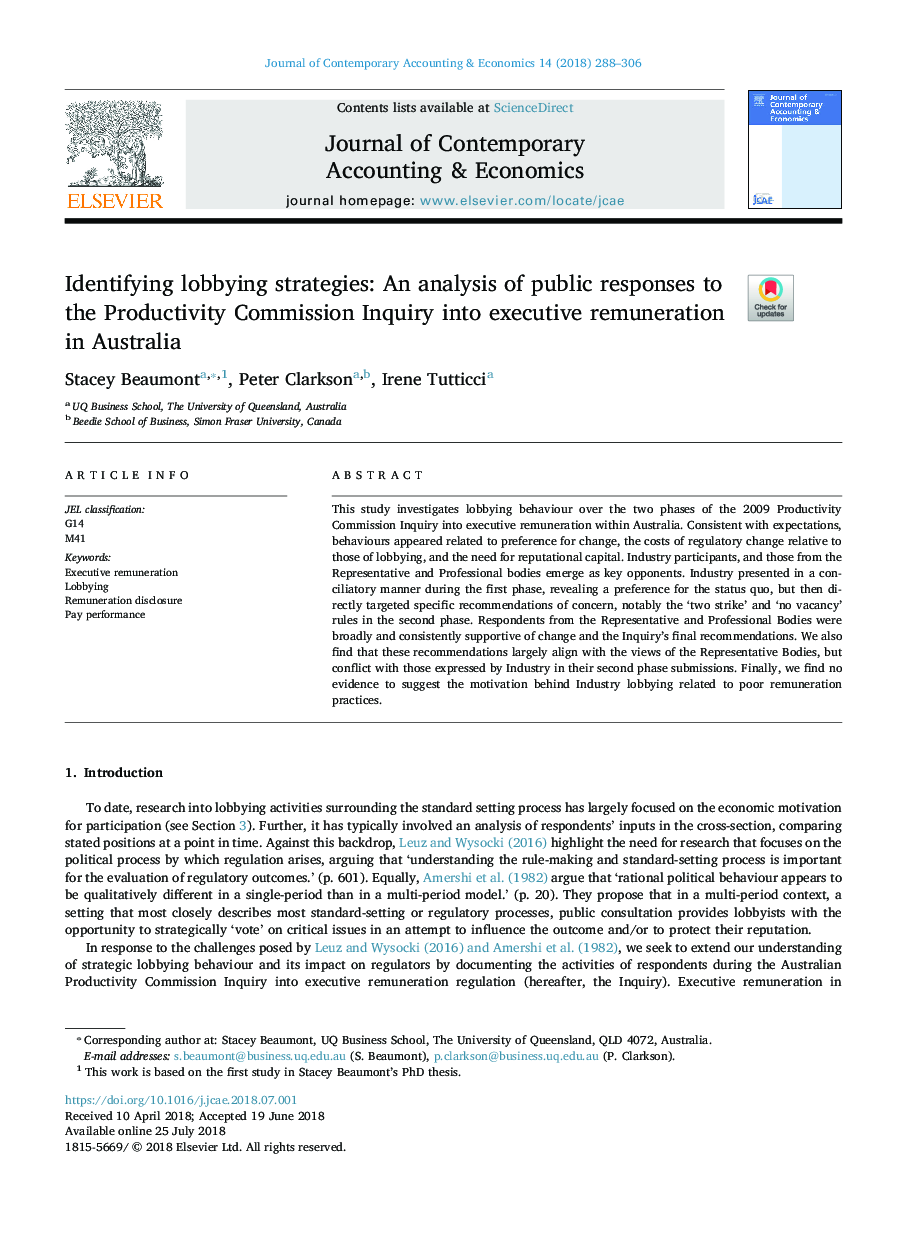| کد مقاله | کد نشریه | سال انتشار | مقاله انگلیسی | نسخه تمام متن |
|---|---|---|---|---|
| 7356969 | 1478417 | 2018 | 19 صفحه PDF | دانلود رایگان |
عنوان انگلیسی مقاله ISI
Identifying lobbying strategies: An analysis of public responses to the Productivity Commission Inquiry into executive remuneration in Australia
ترجمه فارسی عنوان
شناسایی استراتژی های لابی: تجزیه و تحلیل واکنش های عمومی به تحقیقات کمیته بهره وری در هزینه های اجرایی در استرالیا
دانلود مقاله + سفارش ترجمه
دانلود مقاله ISI انگلیسی
رایگان برای ایرانیان
ترجمه چکیده
این مطالعه به بررسی رفتار لابیگری در دو مرحله تحقیق کمیسیون بهره وری 2009 در مورد پرداخت هزینه اجرایی در استرالیا می پردازد. مطابق با انتظارات، رفتارهای مربوط به ترجیح تغییر، هزینه های تغییرات نظارتی نسبت به لابیگری و نیاز به سرمایه مجازی به نظر می رسد. شرکت کنندگان در صنعت و کسانی که از نمایندگان و نمایندگان حرفه ای به عنوان مخالفین اصلی ظاهر می شوند. صنعت در طی مرحله اول به شیوه ای مصالحه ای ارائه شده است که نشان دهنده اولویت وضعیت وضعیت است، اما پس از آن به طور مستقیم توصیه های خاصی از نگرانی، به ویژه قوانین "دو اعتصاب" و "بدون خالی" در مرحله دوم، مورد هدف قرار می گیرد. پاسخ دهندگان از نمایندگان و سازمان های حرفه ای به طور گسترده و به طور پیوسته از تغییرات و توصیه های نهایی این تحقیق حمایت می کردند. ما همچنین دریافتیم که این توصیهها عمدتا با دیدگاههای نمایندگان مطابقت دارد، اما با کسانی که در بخش ارائه شده در مرحله دوم صنعت قرار دارند، با آنها مخالف است. در نهایت، ما هیچ مدرکی برای نشان دادن انگیزه لابیگری صنعت در ارتباط با شیوه های پرداخت ضعیف نداریم.
موضوعات مرتبط
علوم انسانی و اجتماعی
مدیریت، کسب و کار و حسابداری
کسب و کار، مدیریت و حسابداری (عمومی)
چکیده انگلیسی
This study investigates lobbying behaviour over the two phases of the 2009 Productivity Commission Inquiry into executive remuneration within Australia. Consistent with expectations, behaviours appeared related to preference for change, the costs of regulatory change relative to those of lobbying, and the need for reputational capital. Industry participants, and those from the Representative and Professional bodies emerge as key opponents. Industry presented in a conciliatory manner during the first phase, revealing a preference for the status quo, but then directly targeted specific recommendations of concern, notably the 'two strike' and 'no vacancy' rules in the second phase. Respondents from the Representative and Professional Bodies were broadly and consistently supportive of change and the Inquiry's final recommendations. We also find that these recommendations largely align with the views of the Representative Bodies, but conflict with those expressed by Industry in their second phase submissions. Finally, we find no evidence to suggest the motivation behind Industry lobbying related to poor remuneration practices.
ناشر
Database: Elsevier - ScienceDirect (ساینس دایرکت)
Journal: Journal of Contemporary Accounting & Economics - Volume 14, Issue 3, December 2018, Pages 288-306
Journal: Journal of Contemporary Accounting & Economics - Volume 14, Issue 3, December 2018, Pages 288-306
نویسندگان
Stacey Beaumont, Peter Clarkson, Irene Tutticci,
